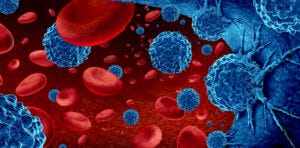First-generation CAR-Ts are “fantastic” says AbbVie, but administrative difficulties mean bispecific antibodies are more likely to provide earlier lines of treatment in conditions like blood cancers.
This week, an Evaluate Pharma report touted AbbVie to become the biggest pharma company by sales in 2028, pulling in a predicted $65.7 billion, despite the expected drop in sales of its blockbuster Humira (adalimumab). But one modality that is unlikely to play significantly in the firm’s topline is chimeric antigen receptor (CAR) T-cell therapies.
Speaking at the Bernstein Annual Strategic Decisions Conference, AbbVie CFO Rob Michael was asked about the curative nature of CAR-T in diseases such as large B-cell lymphoma (LBCL) and multiple myeloma – both blood cancers – and how AbbVie’s non-cell therapy pipeline could fare against the emergence of approved therapies for these conditions, including Bristol-Myers Squibb’s Breyanzi (liso-cel), Gilead’s Yescarta (axicabtagene ciloleucel), and J&J’s Carvykti (ciltacel).

Image: Stock Photo Secrets
“One of the reasons that we made a decision to focus on CD3s,” he told investors “is that we believe that our preference at the time was to move with bispecifics into earlier lines of therapy. CAR-Ts are fantastic for patients, but first-generation CAR-Ts are not easy to administer. You’re taking blood from the patient. The patient has to have their marrow reconditioned, reengineered, and reinfused back in, so it’s not a straightforward paradigm.”
AbbVie’s pipeline includes ABBV-383, a BCMA x CD3 T-cell engaging bispecifc antibody being studied in relapsed or refractory multiple myeloma currently in Phase I trials, and epcoritamab (DuoBody-CD3xCD20), a subcutaneous bispecific antibody in development with Genmab. The firm recently announced positive topline results from a Phase I/II clinical trial for LBLC.
“When you look now at the kind of efficacy that we’re seeing with epcoritamab, then we believe that it can be positioned earlier and CAR-Ts could be held off until later lines of therapy.”
However, AbbVie is looking to play in the CAR-T space in the longer-term, Michael said, having made “some calculated investments from a deal perspective in next-gen CAR-Ts.”
In February 2021, the company entered into a collaboration with Caribou Biosciences for the research and development of allogeneic CAR-T therapies. Allogeneic, or off-the-shelf, cell therapies have been touted as the next-generation of CAR-T due to their potential to overcome logistical and cost of manufacturing challenges associated with autologous products.
“We’ll see how that space evolves, and we’re always watching to see what’s happening and to try and think about innovation further down the line, whether it could be, for instance, in vivo transduction later, which would simplify everything. But if that happens, it’s going to happen in the outer years of this decade.”

schedl_b_and_w.jpg?width=100&auto=webp&quality=80&disable=upscale)


schedl_b_and_w.jpg?width=400&auto=webp&quality=80&disable=upscale)


